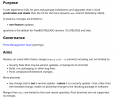Sometimes when i do a git pull of quarterly ports i have to recompile thousands of ports because of a dependency on some root port that changed from version x to version x_01.
That's not very stable and quiet annoying.
So using poudriere & quarterly i'm in a compilation hell. Compiling and a few days later compiling again.
Sometimes when compilation has ended , i can start compilation again because of changes to ports with lots of dependencies.
Feel free to comment.
That's not very stable and quiet annoying.
So using poudriere & quarterly i'm in a compilation hell. Compiling and a few days later compiling again.
Sometimes when compilation has ended , i can start compilation again because of changes to ports with lots of dependencies.
Feel free to comment.

